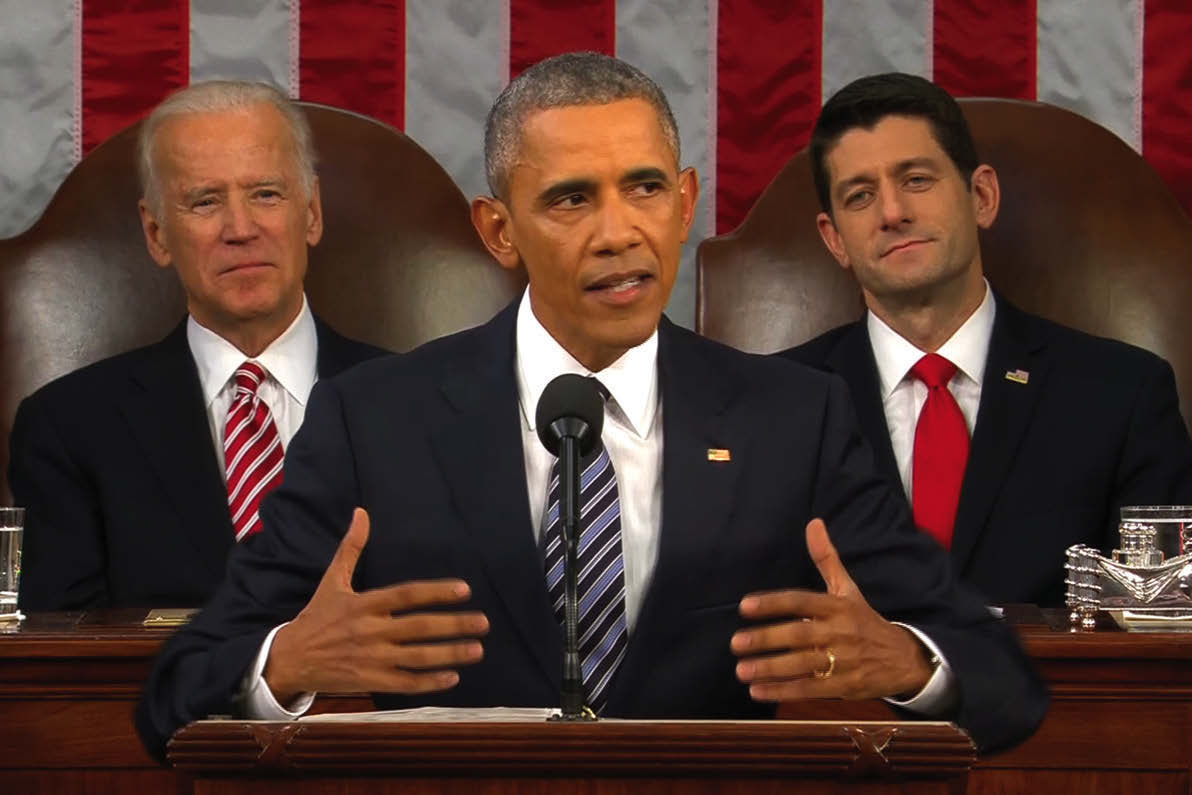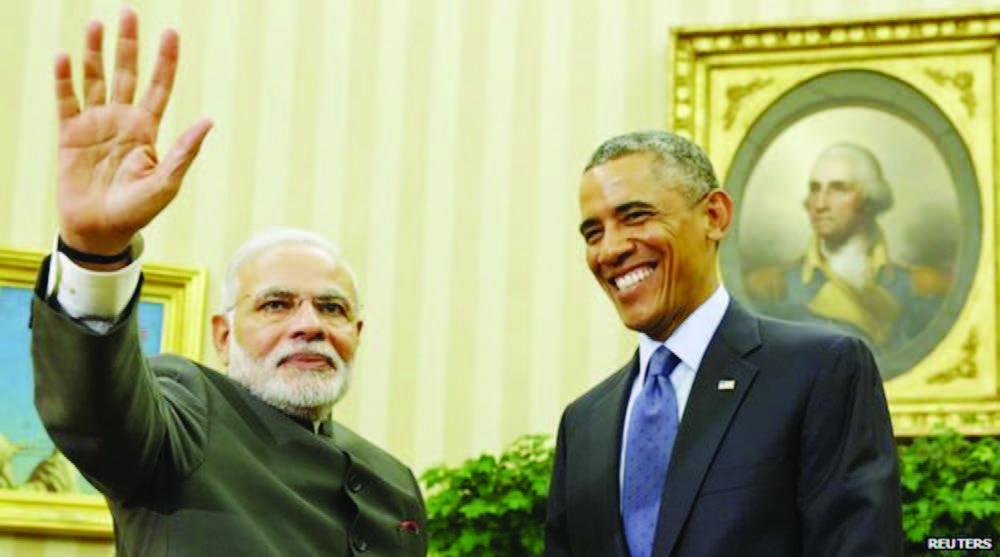
WASHINGTON (TIP): President Barack Obama was probably at his best when he delivered his seventh and final State of the Union address on Tuesday, January 12 at a joint session of Congress.
“Tonight marks the eighth year I’ve come here to report on the State of the Union. And for this final one, I’m going to try to make it shorter. I know some of you are antsy to get back to Iowa.”
Obama emphasized the need for politicians to have a conciliatory approach to the issues and not remain divided along party lines. He spoke of good people on both sides of the aisle who have understood the need to have a bipartisan approach. This helps in solving many a knotty issues, he said.
Instead of talking about his immediate concerns he focused on his vision of a future America -what America has to be in the coming years and decades. He took credit for disengaging America from conflicts abroad, without compromising the country’s position as the most powerful nation of the world and as the leader of the world.
He recalled that when he became President, America was reeling under a terrible economic crisis. In the years that followed America recovered, with deficit going down, economy improving and jobs being created.
There’s no way Obama’s final State of the Union wouldn’t mention his most significant legislation. In spite of its controversy, Obama said the Affordable Care Act
(Obamacare) has led to nearly 18 million more people gaining health insurance and has helped to slow health care cost inflation. He added that the law didn’t destroy the job market, despite pessimistic predictions from critics. “Our businesses have created jobs every single month since it became law,” he said.
While Obama took legitimate pride in his achievements, he did not forget to target the prophets of doom in the Republican Party. He appeared to relish the chance to take on Republican critics who have lambasted his performance as President of America.
He pushed back against GOP critics who sketch a gloomy picture of an America in economic decline and weakened on the world stage.
“All the talk of America’s economic decline is political hot air. Well, so is all the rhetoric you hear about our enemies getting stronger and America getting weaker. The United States of America is the most powerful nation on Earth. Period. It’s not even close.”
Yet even as he defended his seven years as commander in chief, Obama acknowledged he didn’t deliver on his campaign promise to bring a more civil tone to a sharply divided Capitol Hill.
“It’s one of the few regrets of my presidency – that the rancor and suspicion between the parties has gotten worse instead of better,” Obama said. “There’s no doubt a president with the gifts of Lincoln or Roosevelt might have better bridged the divide, and I guarantee I’ll keep trying to be better so long as I hold this office.”
Obama rebuked politicians who draw congressional districts to protect safe seats and vowed to launch a national effort to secure voting rights, an issue particularly important to minority communities.
He said a future of peace, prosperity and opportunity is only attainable “if we fix our politics.”
Specific problem areas identified by Obama: reducing barriers to voting, limiting the influence of money in politics, ending the drawing of congressional districts to benefit politicians’ interests.
Obama took indirect swipes at GOP presidential candidates for bluster on fighting terrorism.
“Our answer needs to be more than tough talk or calls to carpet bomb civilians. That may work as a TV sound bite, but it doesn’t pass muster on the world stage.”
The first African-American president also offered a detailed rebuttal of the kind of politics that alienates people rather than unites them. At times, Obama was almost pleading with his audience to embrace the vision of hope and change that swept him to power and then was sullied by the bitter realities of polarized politics over a darker vision of America’s character.
“What I am asking for his hard. It’s easier to be cynical; to accept that change isn’t possible, and politics is hopeless, and to believe that our voices and actions don’t matter,” Obama said.
“But if we give up now, then we forsake a better future.”
It seemed clear that the President had Trump in his thoughts.
“As frustration grows, there will be voices urging us to fall back into tribes, to scapegoat fellow citizens who don’t look like us, or pray like us, or vote like we do, or share the same background,” Obama said, voicing a familiar critique of Democrats and some Republicans at the rhetoric of the billionaire real estate mogul whose populist campaign has taken American politics by storm.
“We can’t afford to go down that path. It won’t deliver the economy we want, or the security we want, but most of all; it contradicts everything that makes us the envy of the world.”
The man who burst on the political scene by rejecting the notion that there was a red America or a blue America owned up to one regret in an otherwise optimistic address: That average people feel the system is rigged “in favor of the rich or the powerful or some narrow interest.” and diagnosed it as a sick political system.
“It doesn’t work if we think the people who disagree with us are all motivated by malice, or that our political opponents are unpatriotic,” Obama warned, and even accepted a share of the blame for not uniting warring political factions.
“It’s one of the few regrets of my presidency — that the rancor and suspicion between the parties has gotten worse instead of better. There’s no doubt a president with the gifts of Lincoln or Roosevelt might have better bridged the divide, and I guarantee I’ll keep trying to be better so long as I hold this office.
Obama pledged to keep working on that “so long as I hold this office.”
President likened administration’s push against cancer to a new “moon shot.” Assigned Vice President Joe Biden to lead a new push to fight cancer, building on a large increase in federal financing for the National Institutes of Health.
“Let’s make America the country that cures cancer once and for all.”
He identified a number of areas where Democrats and Republicans might be able to find common ground: pursuing criminal justice reform, promoting trade, fighting opioid abuse. Made an overture to new House Speaker Paul Ryan by highlighting his interest in fighting poverty. “I’d welcome a serious discussion about strategies we can all support, like expanding tax cuts for low-income workers without kids.”
Obama promised resolve in fighting terrorism and the Islamic State group, but dismissed “over-the-top claims that this is World War III.” Rejected the idea that IS threatens “our national existence.”
“We just need to call them what they are. Killers and fanatics who have to be rooted out, hunted down and destroyed.”
Hitting out at those who do not consider climate change an important issue, he predicted that those who dispute the science of climate change will end up “pretty lonely.”
“You’ll be debating our military, most of America’s business leaders, the majority of the American people, almost the entire scientific community, and 200 nations around the world who agree it’s a problem and intend to solve it.”
“Our brand of democracy is hard. But I can promise that a year from now, when I no longer hold this office, I’ll be right there with you as a citizen – inspired by those voices of fairness and vision, of grit and good humor and kindness that have helped America travel so far. Voices that help us see ourselves not first and foremost as black or white or Asian or Latino, not as gay or straight, immigrant or native born; not as Democrats or Republicans, but as Americans first, bound by a common creed. Voices Dr. King believed would have the final word – voices of unarmed truth and unconditional love.”
“That’s the America I know. That’s the country we love. Clear-eyed. Big-hearted. Undaunted by challenge. Optimistic that unarmed truth and unconditional love will have the final word,” Mr. Obama said.
“That’s what makes me so hopeful about our future. Because of you. I believe in you. That’s why I stand here confident as I have ever been that the State of our Union is strong.”





Be the first to comment